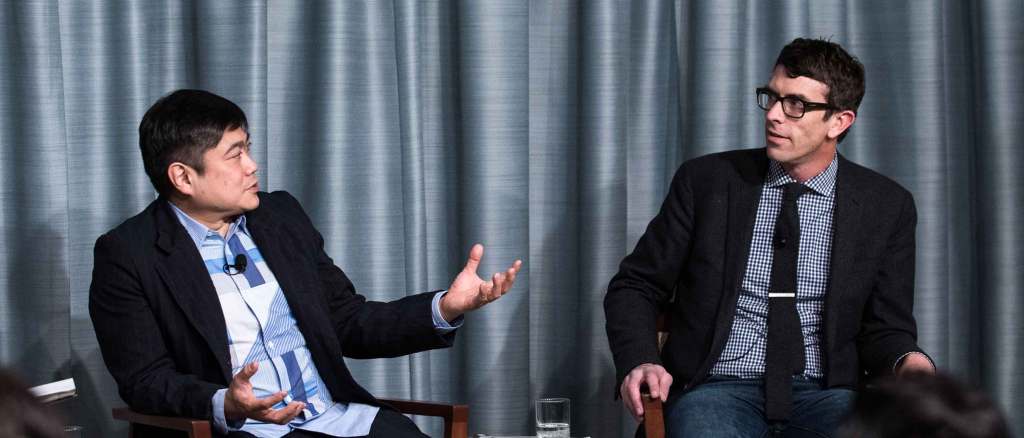
Technology is dramatically transforming every aspect of society—from business to culture to our most intimate relationships—creating a “faster future.” With these new advancements comes an urgent need to investigate how we use and understand technology. At their core, new technologies may be essentially neutral—but it is difficult to foresee how these same technologies might be used in the future, and to what ends.
So as technology continues to transform almost every aspect of our lives, its important to acknowledge the ways it can further exacerbate inequality, and what we can do to prevent that.
In their new book, Whiplash: How to Survive Our Faster Future, MIT Media Lab director Joi Ito and journalist and MIT visiting scholar Jeff Howe lay out new “rules” for surviving and advancing in this age of rapid technological change, including emphasizing “disobedience over compliance,” “resilience over strength,” and “diversity over ability.” Ito and Howe came to the Ford Foundation to discuss how these ideas are playing out in the world today and how they can help us, not only survive, but thrive, in this “faster future.”
Transcript
Accessibility Statement
- All videos produced by the Ford Foundation since 2020 include captions and downloadable transcripts. For videos where visuals require additional understanding, we offer audio-described versions.
- We are continuing to make videos produced prior to 2020 accessible.
- Videos from third-party sources (those not produced by the Ford Foundation) may not have captions, accessible transcripts, or audio descriptions.
- To improve accessibility beyond our site, we’ve created a free video accessibility WordPress plug-in.
Learning over education
Though we typically think that learning and education are the same thing, throughout Whiplash Ito and Howe draw a distinction between the two. Too often, formal education emphasizes accepted ideas and limits our ability to create new ones. This kind of education is contrary to the pedagogical spirit of learning, which enables us to explore new ideas, tinker, innovate, and question the status quo. Ito says he was never good at education, which he always thought of as “the stuff that people try to do to you.” Learning, by contrast, is a self-initiating process, something a person does for him- or herself.
Transcript
Accessibility Statement
- All videos produced by the Ford Foundation since 2020 include captions and downloadable transcripts. For videos where visuals require additional understanding, we offer audio-described versions.
- We are continuing to make videos produced prior to 2020 accessible.
- Videos from third-party sources (those not produced by the Ford Foundation) may not have captions, accessible transcripts, or audio descriptions.
- To improve accessibility beyond our site, we’ve created a free video accessibility WordPress plug-in.
Disobedience over compliance
As Ito defines it, “disobedience” means owning your unique point of view and saying what you really think. It means trusting your instincts and refusing to follow the rules if those rules prevent you from advancing an idea, cause, or agenda you believe in. Not to question the status quo is to be in tacit compliance with the status quo. Disobedience means challenging norms—their basis, logic, efficacy, and consequences—in order to create better ways of solving problems. Ito draws a comparison to leaders of the 1960s civil rights movement, who were only able to change the world because they disobeyed, questioned, and refused to follow society’s oppressive, discriminatory rules. Challenging injustice, he says, is a moral imperative.
Transcript
Accessibility Statement
- All videos produced by the Ford Foundation since 2020 include captions and downloadable transcripts. For videos where visuals require additional understanding, we offer audio-described versions.
- We are continuing to make videos produced prior to 2020 accessible.
- Videos from third-party sources (those not produced by the Ford Foundation) may not have captions, accessible transcripts, or audio descriptions.
- To improve accessibility beyond our site, we’ve created a free video accessibility WordPress plug-in.
Diversity over ability
Overwhelmingly, research shows that diversity leads to more productivity and success. The challenges our society faces today, amid so much technological change, makes diversity even more critical—because having a range of diverse perspectives and experiences can help us find fresh solutions to complicated problems. But this issue is more complicated than simply including more diverse voices in a boardroom. The disproportionate impacts of crime, criminalization, and health threats on communities of color (as reported by the New York Times in 2015), shows that we need to examine who is and isn’t involved in shaping our society. Excluding entire demographics sets our societies up to fail. It’s not only that diversity is healthy and gratifying—it’s necessary for us to prosper, perhaps now more than ever.


